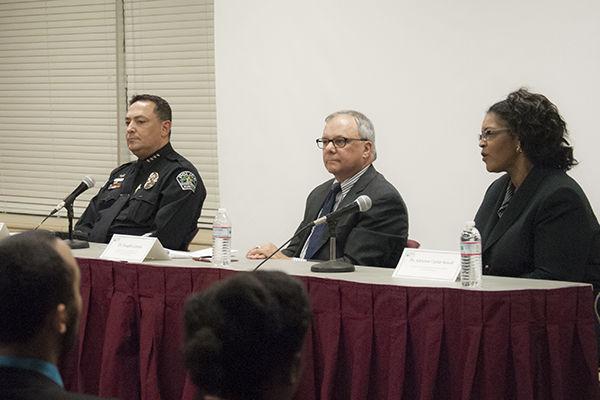The MSC Wiley Lecture Series and MSC Woodson Black Awareness Committee co-hosted a public forum Wednesday night discussing the effects of greater militarization of American police forces.
“Ready For Combat: Police Militarization and its Effects” featured a panel of Austin Chief of Police Art Acevedo, Texas A&M Assistant Psychology Professor Adrienne Carter-Sowell and Bush School senior lecturer Joseph Cerami. After a 30-minute moderated opening discussion, the panel was opened up to questions from those in attendance.
The main focus of discussion for the evening stemmed from the 1033 Program, a program that has transferred $5.1 billion dollars worth of equipment from the military to local police departments across the country. Acevedo opened discussion by further explaining what the program entails to the audience.
“State and local law enforcement really have a challenge in terms of being able to complete their missions that they face on a regular basis and in terms of responding to the threat picture that we have as a nation,” Acevedo said. “The criminal element has changed a lot in terms of what they have access to in this country, and that program provides needed equipment to state departments and locals.”
The program has sparked controversy, as images of police officers wielding high-powered weapons in situations such as in Ferguson, Mo., have been burned into the minds of the public at large.
“You have police agencies using [a bearcat rescue vehicle] and have images of a guy looking down the scope of a long rifle,” Acevedo said. “That’s not what that vehicle is for. That’s a problem. You don’t use a long rifle and a scope just to spot out trouble makers. That’s what binoculars are for.”
The presenters also cautioned the public to be wary of over-using the term “militarization.”
“The word militarization is very loaded,” Cerami said. “Certainly there is a concern about over-militarization from police forces. In my view there are good ways to use the term and bad ways to use the term. There’s a long history of military involvement in the civilian community.”
The panel also acknowledged the growing mistrust of police forces nationwide, with Carter-Sowell attributing it to the general psychology of the situation.
“When you are marginalized and feel invisible, you start to make assumptions and use your bias to judge others,” Carter-Sowell said. “My research with individuals who feel that their voices have not been heard shows that they act much more aggressive. Your perspective is that you start to think of others as the same and yourself as different.”
Acevedo emphasized a need for departments nationwide to help quell these concerns by connecting with their respective communities on a much deeper level than they currently do.
“You do more to hurt public safety when you have policies that use racial profiling,” Acevedo said. “That’s the kind of thing that will absolutely destroy [perception]. By building trust and relationships, and being reflective of the community, we can have the rule of law, not just have a police state, and make sure that we protect freedoms.”
The event concluded with Acevedo issuing a challenge to police departments across the nation.
“The number one thing that people complain about about cops is that they’re jerks,” Acevedo said. “I always tell my cops that courtesy and respect go a long way. A smile is a sign of confidence. We work for [the public] and we’ve lost our standing in too many communities because we’ve forgotten who we work for. We work for the people.”
MSC organizations tackle police militarization in forum
November 19, 2014

Allison Bradshaw — THE BATTALION
Chief of Police Art Acevedo, Joseph Cerami, and Adrienne Carter-Sowell were the speakers at the public forum “Ready For Combat: Police Militarization and its Effects” Wednesday evening.
0
Donate to The Battalion
$2790
$5000
Contributed
Our Goal
Your donation will support the student journalists of Texas A&M University - College Station. Your contribution will allow us to purchase equipment and cover our annual website hosting costs, in addition to paying freelance staffers for their work, travel costs for coverage and more!
More to Discover









